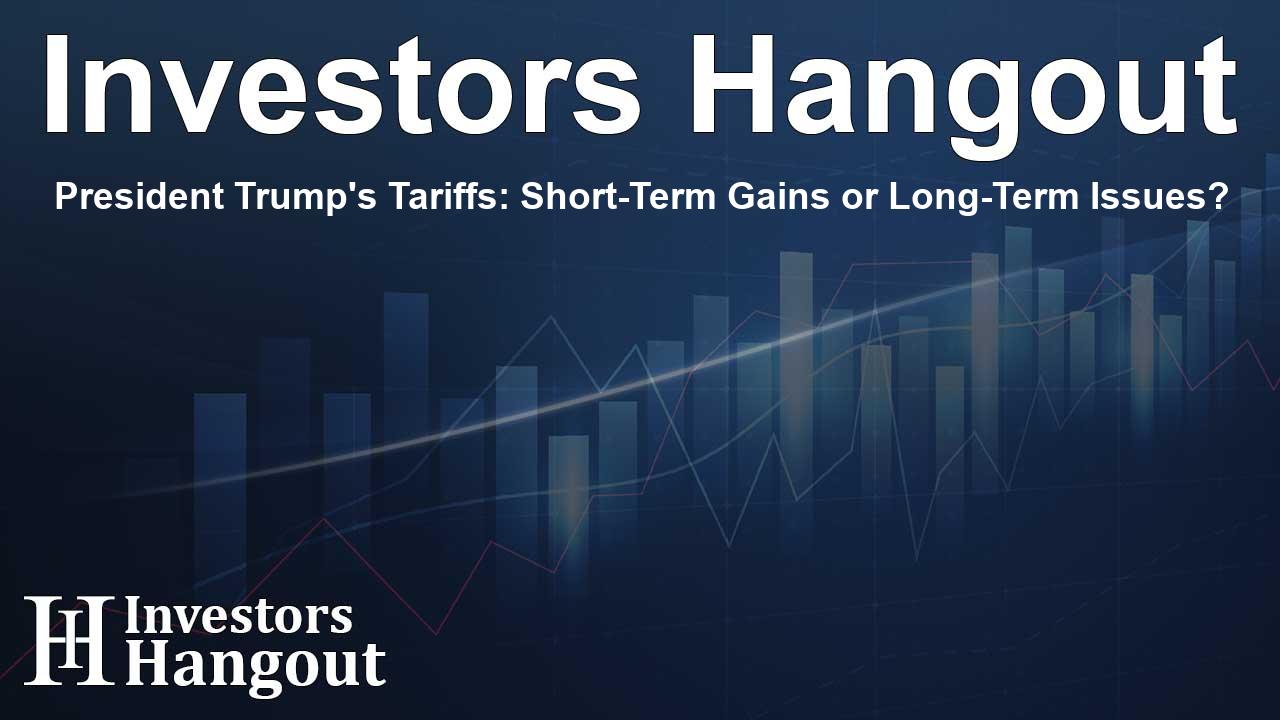President Trump's Tariffs: Short-Term Gains or Long-Term Issues?

President Trump's Trade Policy and Its Implications
President Donald Trump‘s trade strategies have stirred much discussion and analysis, showcasing a blend of short-term benefits against potentially serious long-term repercussions. His aggressive approach to tariffs reflects a shift in American trade dynamics, with significant implications for various industries.
Understanding the Tariff Increase
The implementation of tariffs has increased the effective U.S. tariff rate dramatically, with figures now estimated as high as 17-19% compared to previous rates of 2.5%. In spite of these measures, many trading partners have resisted retaliating with their tariffs. Notably, the U.S. trade deficit observed a notable narrowing earlier this year, with statistics revealing a 16% reduction, particularly with China, marking the smallest deficit seen in over two decades.
Challenges Surrounding Tariff Strategies
While the narrowing trade deficit may appear as a success, several hurdles remain. Concerns linger regarding whether U.S. trading partners will maintain their commitments, and economists are wary of the inflationary effects that surface as a consequence of heightened tariffs. Furthermore, the legality surrounding Trump’s unilateral tariff impositions is facing challenges, with significant pending rulings that could escalate to the Supreme Court.
Superficial Victories or More?
Despite what might be deemed tactical victories in securing eight agreements with various countries—where tariffs on goods range between 10% and 20%—critics maintain that the benefits may be more superficial than they appear. The adverse economic impacts on American workers and the potential for reduced job growth hint at deeper systemic issues that cannot be overlooked.
According to Josh Lipsky, head of economic studies at the Atlantic Council, “From a geopolitical standpoint, concessions seem plentiful; economically, however, the trade war appears less than fruitful.”
The Connection Between Tariffs and Inflation
The trade war's roots extend to inflation concerns, as evidenced by recent surges attributed to tariff policies. Economic indicators reveal that input prices have risen at the fastest rate since the later stages of the previous year, contributing to renewed inflation worries across the U.S. economy.
Outlook on the Economic Future
Prominent economists like Mark Zandi, Chief Economist at Moody’s Analytics, are vocal about their fears regarding a looming recession. With consumer spending stagnating and employment levels anticipated to decline, a precarious economic landscape lies ahead.
The Future of Tariffs Post-Trump
Interestingly, even if political tides shift in the future, some experts anticipate that current tariffs will persist. Professor Joao Gomes from the Wharton Business School notes that both major political parties might endorse these tariffs for their potential to generate significant revenue.
Understanding Strategic Tariffs
Moreover, projections from JPMorgan Chase's Center for Geopolitics suggest that the average tariff rate may likely settle around 22% for key industry sectors. This is indicative of a cultural shift wherein tariffs are seen as vital for bolstering strategic industries such as semiconductors and defense, making any reversal of such policies less likely even after Trump's presidency.
“Even if the next U.S. president leans towards the trade strategies seen pre-2017, they would encounter substantial barriers to unwinding the tariff structures established during the Trump administration,” according to a report from JPMorgan.
Frequently Asked Questions
What are the key outcomes of Trump’s tariff policies?
Trump's tariffs have led to a significant increase in U.S. trade tariffs, affecting many trading partners and contributing to a reduced trade deficit.
How are inflation rates impacted by the tariffs?
Recent reports show that tariffs have contributed to rising input prices, renewing inflation concerns and potentially leading to economic strain.
Will tariffs continue beyond Trump’s presidency?
Experts suggest that tariffs may persist due to their revenue-generation potential, regardless of who holds the presidency in the future.
What are the economic implications of these tariffs?
The long-term impacts include potential job losses and slower economic growth, along with ongoing legal challenges surrounding tariff strategies.
How do economists view the effectiveness of Trump’s trade policies?
Many economists argue that while concessions from other countries appear beneficial, the economic consequences for Americans may outweigh these gains.
About The Author
Contact Dylan Bailey privately here. Or send an email with ATTN: Dylan Bailey as the subject to contact@investorshangout.com.
About Investors Hangout
Investors Hangout is a leading online stock forum for financial discussion and learning, offering a wide range of free tools and resources. It draws in traders of all levels, who exchange market knowledge, investigate trading tactics, and keep an eye on industry developments in real time. Featuring financial articles, stock message boards, quotes, charts, company profiles, and live news updates. Through cooperative learning and a wealth of informational resources, it helps users from novices creating their first portfolios to experts honing their techniques. Join Investors Hangout today: https://investorshangout.com/
The content of this article is based on factual, publicly available information and does not represent legal, financial, or investment advice. Investors Hangout does not offer financial advice, and the author is not a licensed financial advisor. Consult a qualified advisor before making any financial or investment decisions based on this article. This article should not be considered advice to purchase, sell, or hold any securities or other investments. If any of the material provided here is inaccurate, please contact us for corrections.
